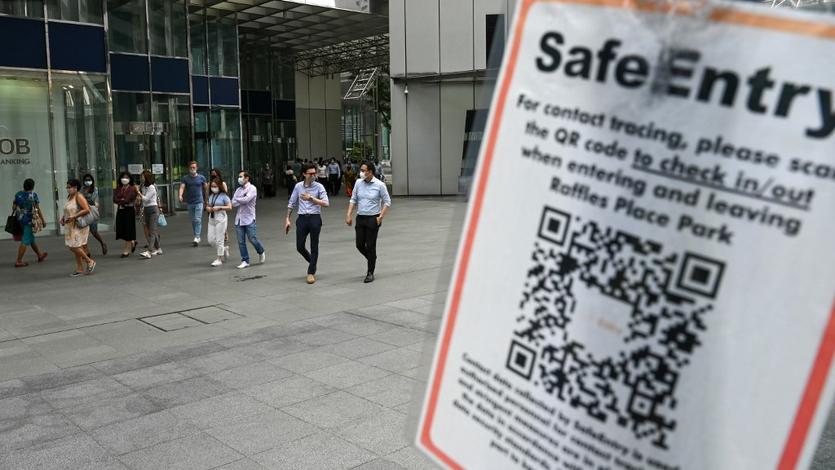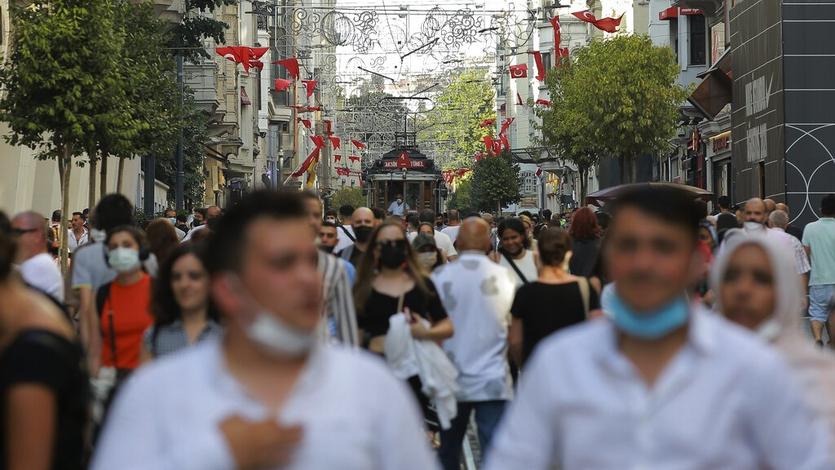 A health worker inoculates a woman with a dose of the Sinovac COVID-19 vaccine during a mass vaccination at a zoo in Surabaya on Sept 13, 2021. (JUNI KRISWANTO / AFP)
A health worker inoculates a woman with a dose of the Sinovac COVID-19 vaccine during a mass vaccination at a zoo in Surabaya on Sept 13, 2021. (JUNI KRISWANTO / AFP)
SINGAPORE / YANGON / JERUSALEM / TEHRAN / ISTANBUL / WELLINGTON / SYDNEY / KUALA LUMPUR / SEOUL / ULAN BATOR / NEW DELHI / ISLAMABAD / VIENTIANE - Indonesia is finalizing a plan to offer free COVID-19 vaccine boosters to more than 114 million people in anticipation of an “inevitable” third wave of coronavirus outbreak.
Free booster shots are being considered for people in the low income category under various government programs, according to Coordinating Minister of Economic Affairs Airlangga Hartarto.
The plan for 137.2 million doses of booster vaccines to cover 50 percent to 60 percent of the population will be decided this week, he said in a briefing on Monday.
The government has said another surge of infections caused by new variants is “inevitable” and that a third wave of outbreak could occur in November or December.
Australia
The Australian state of Victoria is suffering its highest single day increase in locally acquired COVID-19 cases.
Victoria recorded 950 new locally acquired cases and seven additional deaths in the 24 hours to midnight Tuesday. Daily case numbers in the state are now rising by about 100 each day.
Victoria's Health Minister Martin Foley said the strain on the state's healthcare system had begun to tighten.
As of Tuesday, 78.7 percent of the state's over-16 population had received the first dose of the vaccine, and 48.4 percent were fully vaccinated.
Meanwhile, the previous COVID-19 epicenter New South Wales (NSW) is trending in the opposite direction with daily case numbers dropping below 1,000 this week. The state recorded 863 new locally acquired cases on both Tuesday and Wednesday.
It is not, however, all good news for that state, as it recorded 15 deaths in the 24 hours to 8:00 pm local time on Tuesday, the highest single-day death toll yet. NSW has had 331 related deaths in this outbreak.
Separately, Australia’s federal government will start to withdraw support from the COVID-19 Disaster Payment when vaccination thresholds are reached, Treasurer Josh Frydenberg said in an emailed statement.
The temporary payment for those who have lost work will begin to transition once a state or territory reaches 70 percent full vaccination of its population who are 16 years and older.
At 80 percent vaccination rate, the temporary payment will step down over a period of two weeks before ending.
The program has supported about 2 million Australians with over A$9 billion ($6.50 billion) payments made since it was announced in June.
India
India's COVID-19 tally rose to 33,716,451 on Wednesday, as 18,870 new cases were registered during the past 24 hours across the country, showed the federal health ministry's latest data.
Besides, as many as 378 deaths due to the pandemic since Tuesday morning took the total death toll to 447,751.
Most of the new cases and deaths respectively were reported from the southern state of Kerala.
Iran
Iran on Tuesday reported 11,701 new COVID-19 cases, taking the country's total infections to 5,559,691.
The pandemic has so far claimed 119,888 lives in the country, after 239 new deaths were registered in the past 24 hours, according to Iran's Ministry of Health and Medical Education.
ALSO READ: Malaysia pulls ahead in vaccinations with Chinese supplies and cooperation
 A medic from Israel's Magen David Adom emergency service administers a Pfizer coronavirus vaccine at a school in Holon, Israel on Sept 3, 2021. (TSAFRIR ABAYOV / AP)
A medic from Israel's Magen David Adom emergency service administers a Pfizer coronavirus vaccine at a school in Holon, Israel on Sept 3, 2021. (TSAFRIR ABAYOV / AP)
Israel
Israel reported 5,159 new COVID-19 cases on Tuesday, bringing the country's total infections to 1,274,395, the state's Ministry of Health said.
The death toll from the virus rose by eight to 7,692, while the number of patients in serious condition decreased from 671 to 660, the ministry said.
Malaysia
Malaysia reported 11,332 new COVID-19 infections as of midnight Tuesday, bringing the national total to 2,220,526, according to the health ministry.
Some 23 of the new cases are imported and 11,309 are local transmissions, data released on the ministry's website showed.
Another 240 deaths were reported, bringing the death toll to 25,935.
Laos
The Lao Ministry of Health on Wednesday reported one new COVID-19 death in the past 24 hours, raising its national death toll to 17.
Deputy Director General of the Department of Communicable Diseases Control under the health ministry Phonepaserd Sayamoungkhoun told a press conference that the new death was a 57-year-old woman living in the Lao capital Vientiane, who had suffered from diabetes and hypertension.
The COVID-19 tally in Laos rose to 23,488 on Wednesday, with 547 new cases recorded in the past 24 hours, including 535 community cases.
Mongolia
Mongolia's COVID-19 tally rose to 301,434 after 2,515 new cases were reported over the past 24 hours, the country's health ministry said Wednesday.
The ministry said that 16 more COVID-19 patients aged over 60 died in the past day, taking the death toll to 1,185.
Myanmar
Myanmar reported 1,630 new COVID-19 cases with 48 more deaths in the past 24 hours, according to a release from the Ministry of Health on Tuesday.
The number of COVID-19 infections has risen to 461,066 while its death toll increased to 17,631 as of Tuesday, according to the release.
 A man wearing a face mask walks on a street during a nationwide COVID-19 lockdown in Wellington on August 18, 2021. (MARTY MELVILLE / AFP)
A man wearing a face mask walks on a street during a nationwide COVID-19 lockdown in Wellington on August 18, 2021. (MARTY MELVILLE / AFP)
New Zealand
New Zealand's daily coronavirus cases jumped to their highest level in weeks on Wednesday, a setback to the South Pacific nation's battle to eliminate the highly infectious Delta variant from its shores.
Health authorities reported 45 new cases, all in the biggest city, Auckland, taking the total number of cases in the current outbreak to 1,230.
It's much higher than the eight reported on Tuesday, and the highest number of daily cases since Sept 2.
COVID-19 Response Minister Chris Hipkins urged New Zealanders to stay calm, saying: "We do expect from time to time there will be blips."
Hipkins said at least 33 of the new cases are known household or close contacts of existing cases and most have been isolating at home or in quarantine facilities while infectious.
"I would encourage people not to read too much into it. We are still aiming to run this into the ground," Hipkins said at a news conference.
A delayed a vaccine rollout, however, means more people are at risk in the latest outbreak.
Ardern is now facing pressure from expatriate Kiwis and their families back home to drop her "zero tolerance" strategy and reopen borders.
The opposition National Party said on Wednesday that it would end lockdowns and reopen borders before Christmas.
"Delta is here, it may not be possible to eliminate it, and it would almost inevitably arrive into the community again. Whatever happens, we need to reopen to the world and National’s plan outlines how we can do that," National Party leader Judith Collins said.
Ardern has announced a phased reopening plan for early next year.
Pakistan
Pakistan reported 1,560 new COVID-19 cases over the past 24 hours, the National Command and Operation Center (NCOC) said on Wednesday.
The overall tally of the infected people climbed to 1,243,385 across the country, said the NCOC, the department leading Pakistan's campaign against the pandemic.
 A coronavirus contact tracing sign is pictured as people walk out during lunch break at the Raffles Place financial business district in Singapore on Sept 14, 2021. (ROSLAN RAHMAN / AFP
A coronavirus contact tracing sign is pictured as people walk out during lunch break at the Raffles Place financial business district in Singapore on Sept 14, 2021. (ROSLAN RAHMAN / AFP
Singapore
Singapore's health ministry reported 2,236 new COVID-19 cases on Tuesday, the highest since the beginning of the pandemic.
A recent rise in cases after the relaxation of some COVID-19 measures has prompted Singapore to pause further reopening. More than 80 percent of its population has been vaccinated against COVID-19.
From this week, Singapore tightened some COVID-19 curbs such as limiting social gatherings to two people and making work from home a default.
ALSO READ: Philippines to open vaccinations to general public
South Korea
South Korea reported 2,885 more cases of COVID-19 as of midnight Tuesday compared to 24 hours ago, raising the total number of infections to 308,725.
The daily caseload was sharply up from 2,289 in the prior day, logging the second-highest figure since the first case was found here in January last year.
The Philippines
The Philippines' Department of Health (DOH) reported 12,805 new COVID-19 infections on Wednesday, bringing the total number of confirmed cases in the Southeast Asian country to 2,535,732.
"The relatively low cases today is due to lower laboratory output (on) Monday," the DOH said.
The DOH also reported 482 more people died from COVID-19 complications, among which 292 were recorded in the past days.
 People walk along Istiklal Street, the main shopping street in Istanbul on July 27, 2021. (MUCAHID YAPICI / AP)
People walk along Istiklal Street, the main shopping street in Istanbul on July 27, 2021. (MUCAHID YAPICI / AP)
Turkey
Turkey is considering expanding the use of COVID-19 vaccine cards to enter packed indoor venues in the upcoming period, the Hurriyet daily reported on Tuesday.
Proof of vaccination will be compulsory for restaurants, cafes, and shopping malls to curb the pandemic during the winter months, when citizens will spend most of their time indoors, according to the report.
Mehmet Ceyhan, head of the Department of the Pediatric Infectious Diseases of the Ankara-based Hacettepe University Faculty of Medicine, told Xinhua that the main areas of concern should be workplaces, public vehicles, and some crowded events like wedding ceremonies where the contamination risk is significantly high.
Under the current regulation, Turks are required to present a negative COVID-19 test result or proof of vaccination for domestic travel and entry to cinemas, theaters, and concert halls.
Meanwhile, the vaccination rate of those who received double vaccine doses in the country of 83 million reached 53 percent on Tuesday.
Ceyhan noted that the vaccination rate of adults needs to be as much as 80 percent to achieve social immunity as Turkey does not vaccinate children below 12 years old.



